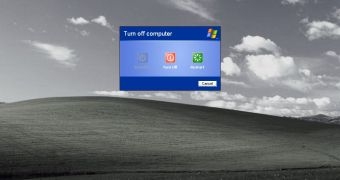Windows XP support will soon come an end, so Microsoft continues the struggle to move users still on this operating system to a new platform capable of providing enhanced security.
Unfortunately for the Redmond-based software firm, statistics indicate that no less than 28 percent of the desktop computers worldwide are still on Windows XP, which is clearly an indication that the transition to a newer version of Windows won’t be completed before the April 8 deadline.
To find out more about the ongoing migration from Windows XP, we’ve reached out to Microsoft looking for more information and a company spokesperson agreed to provide more details on this, clearly pointing out that all users need to abandon the 13-year-old OS version as soon as possible.
Softpedia: How's the migration from Windows XP going? How many users do you estimate would still be on XP on April 8?
Microsoft: Back in September 2007 we announced that support for Windows XP would end on April 8, 2014. Since then we’ve been working with customers and partners to raise awareness that support for Windows XP was ending, and to help them migrate existing Windows XP PCs to a modern operating system.
We are excited to hear from many of our customers who are enjoying the benefits of a modern operating system (OS), from increased speed and reliability to new form factors and touch. We don’t currently breakout figures of active Windows users, but we’re strongly encouraging any consumers or businesses still using Windows XP to migrate before support ends on April 8. 2014.
Softpedia: From your information, what's the number one pick for Windows XP users, Windows 7 or Windows 8.1?
Microsoft: In our experience each business has its own unique OS migration plan based on the specific needs of their organization. Some are moving their full company to Windows 8.1 and others are migrating first to Windows 7.
We’re also seeing many customers deploying Windows 8.1 side-by-side with Windows 7 in key scenarios, such as tablets for mobile users. The high level of compatibility between Windows 7 and Windows 8.1 gives customers the flexibility to deploy the best technology for their unique needs.
From a consumer perspective, with Windows 8.1 people can choose from an incredible array of form factors from laptops to tablets, 2 in 1s and all-in-ones, choosing the best hardware for their needs. Windows 8.1 provides consumers with a faster, more reliable, secure and personal experience with better battery life, coupled with great services such as OneDrive and the apps they need to work and play.
Softpedia: We've heard that the Malicious Software Removal Tool might still get updates on Windows XP after April 8. Is that true?
Microsoft: Yes, Microsoft’s Malicious Software Removal Tool is aligned with the company’s AntiMalware engines and signatures and as such, the removal tool will continue to be provided for Windows XP through July 14, 2015.
However, it’s really important to note that PCs running Windows XP after April 8 2014, should not be considered truly protected, and it is important that business customers and consumers migrate to a current supported operating system so they can receive regular security updates to protect their computer from malicious attacks.
Our research shows that the effectiveness of antimalware solutions on out-of-support operating systems is limited. Running a well-protected solution starts with using modern software and hardware designed to help protect against today’s threat landscape.
Softpedia: Why are people so hard to convince to move from Windows XP? Why do they love this old OS so much?
Microsoft: Windows XP was a great operating system for its time, but the world of technology has changed irrevocably over the past 12 years. Modern operating systems like Windows 8.1 deliver increased security, productivity and mobility that help your organization thrive in a rapidly evolving business environment and help individuals stay on top of and enjoy their busy lives.
Companies still on Windows XP are missing out on tangible benefits of modernizing their IT investments from dramatically enhanced security, broad device choice to meet the needs of a mobile workforce, higher user productivity, and lower total cost of ownership through improved management capabilities.
Softpedia: Give some advice to users who cannot afford to switch from Windows XP before April 8 and who'll still be running it for a little bit more.
Microsoft: Our advice is that any individual or organization running Windows XP needs to migrate to a modern operating system like Windows 8.1.
PCs running Windows XP after April 8 2014 should not be considered to be protected, and it is important that individuals and organizations migrate to a current supported operating system – such as Windows 8.1 – so they can receive regular security updates to protect their computer from malicious attacks. The good news is that there’s a broad range of affordable new Windows devices available in retail and online today.

 14 DAY TRIAL //
14 DAY TRIAL //